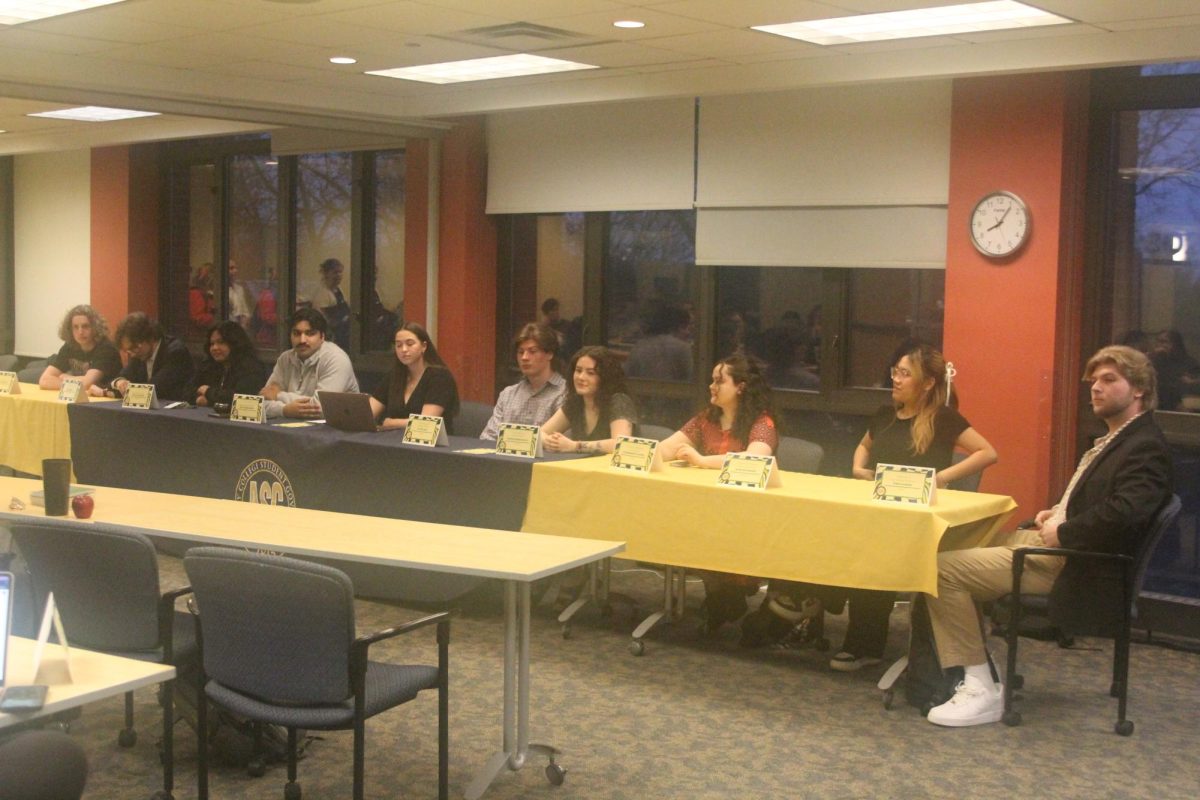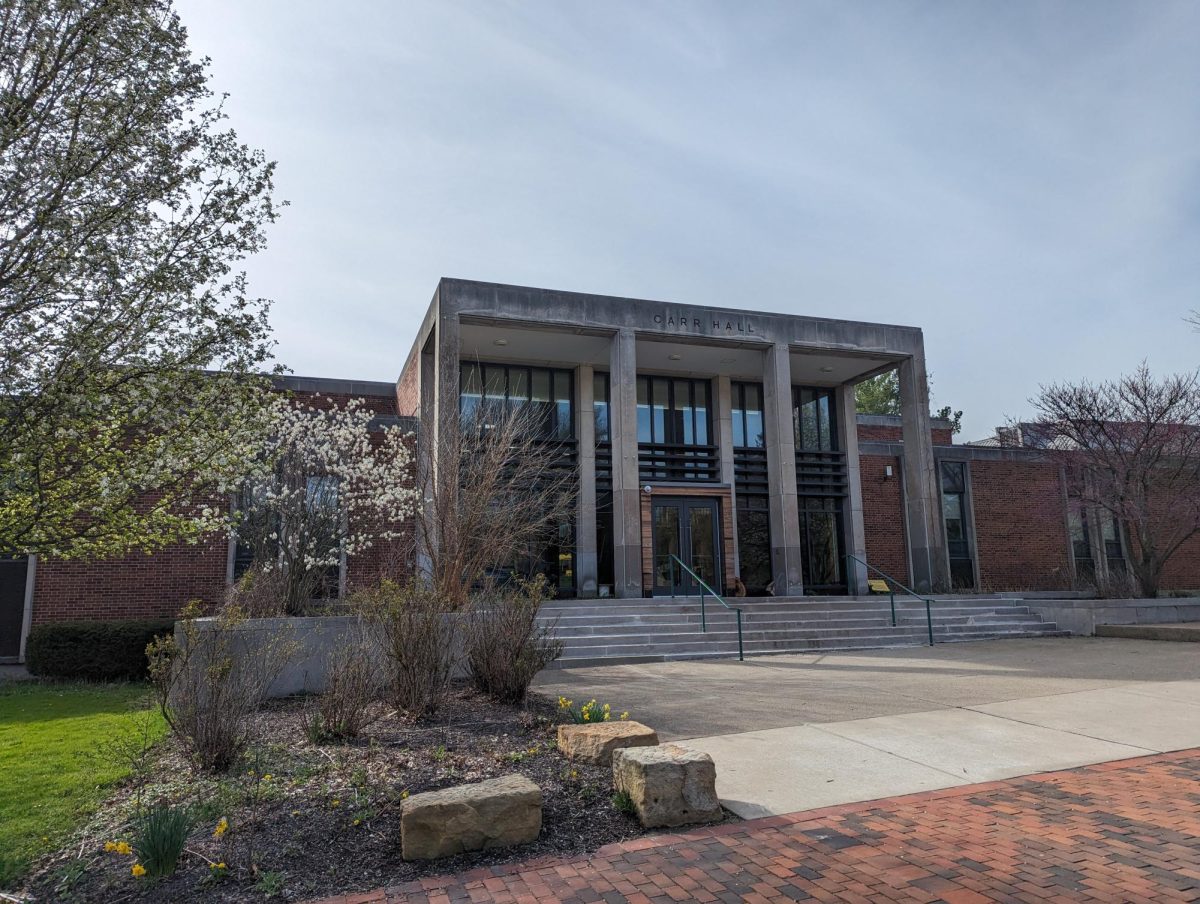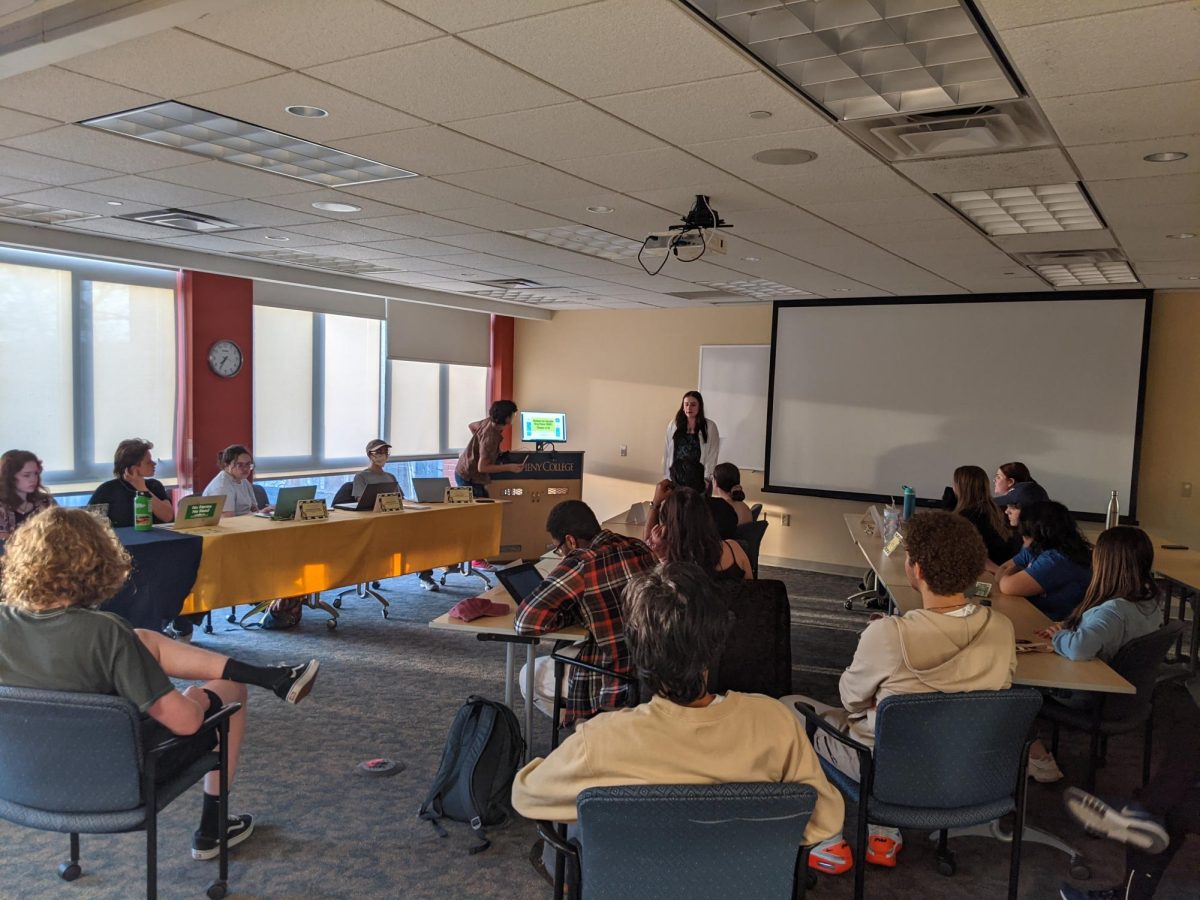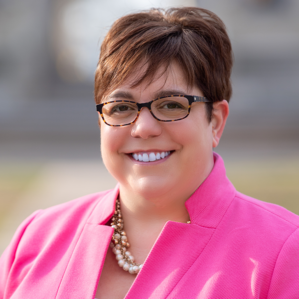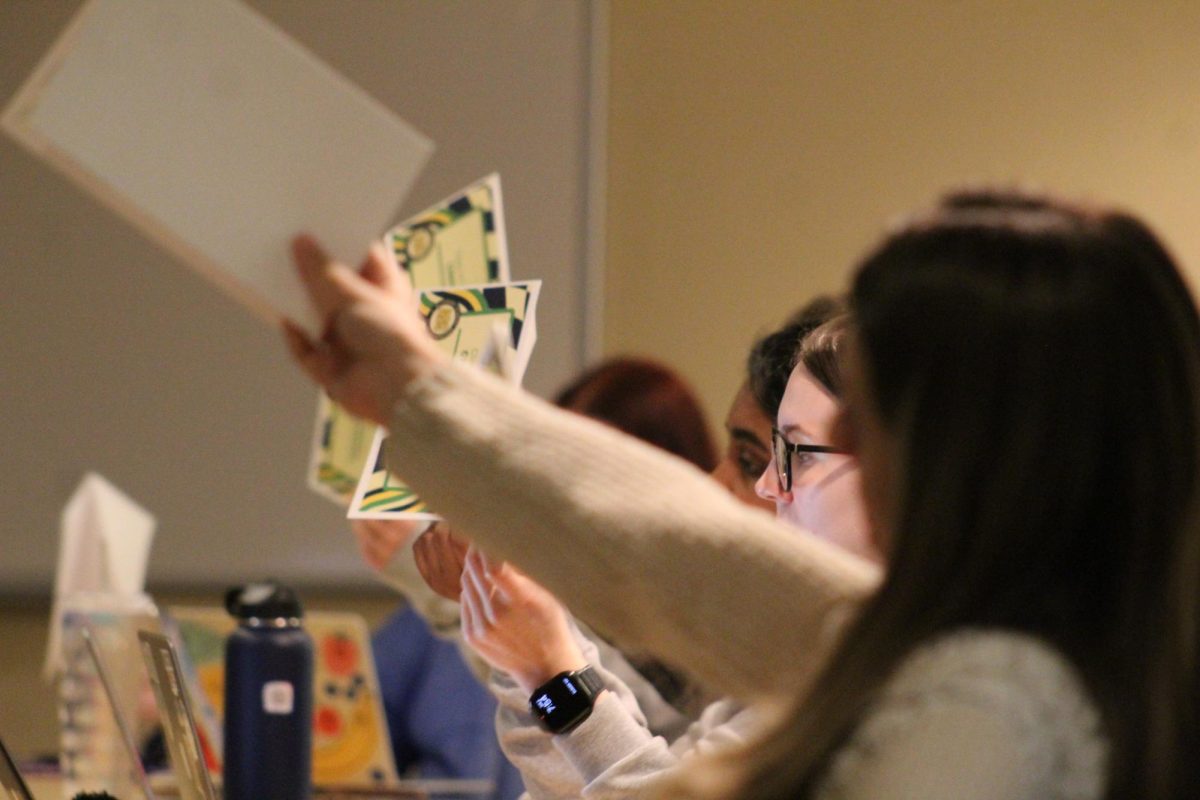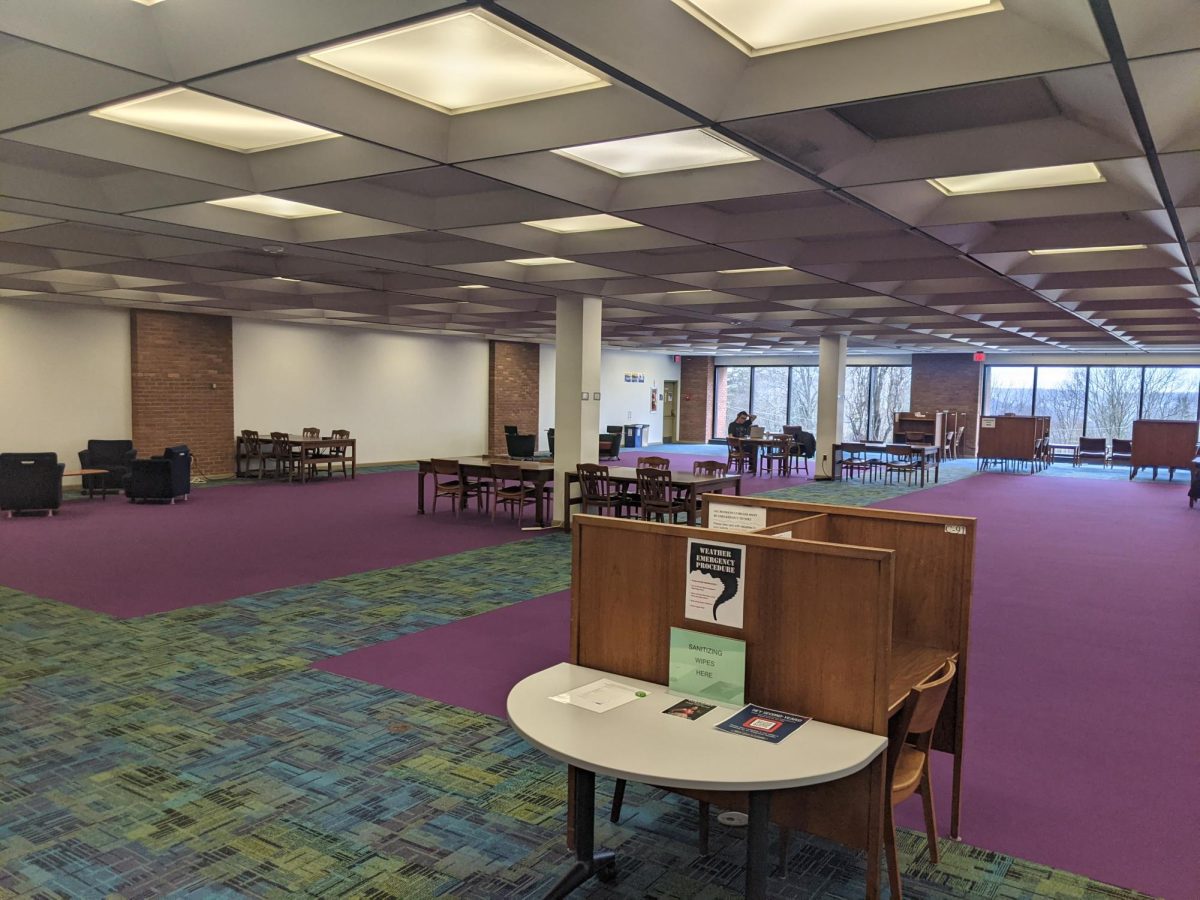To Elanor Bonta, ’26, the concept of banned books is quite familiar.
The soft-spoken, magenta-haired psychology major is originally from China, where many books are outlawed as per the demands of the Communist Party.
Regardless, Bonta is an avid reader, even having read some of the prohibited novels from her home country. “When I left China for sure,” Bonta said. “Everything is banned so I don’t know what counts [as a banned book] and what doesn’t.”
Studying in the quiet of Carnegie Hall, Bonta shared her opinion on a school’s right to censor student reading material, saying it largely depends on the books and the topics in them.
While Bonta may be used to the concept, to the students and faculty at Allegheny College, where accessible and transparent education is valued, the subject of banned books is not taken lightly.
All over the U.S., book bans in school libraries are becoming increasingly common, with more parents, teachers, and students having to come to terms with living in a reality where library material is either challenged or outright prohibited.
Just a few miles up the road, a local school district PENNCREST faced heated controversy after putting in place a ban on books that contained certain material.
In early January 2023, the school board decided in a 5-3 vote to change policy language to prohibit books containing “inappropriate material.”
The policy change removed books from library shelves with “any material with explicitly written, visual or visually implied depictions of sexual acts or simulations of such acts, as well as visual depictions of nudity with the exception of anatomical diagrams and classical works of art.”
The school board originally made changes to the policy after member David Valesky opposed a list including books dealing with racial issues that he considered to “openly promote” the social justice group Black Lives Matter, which he referred to as a “hate group,” according to the Meadville Tribune.
Despite the rural district having a conservative majority, the book ban received a lot of backlash from those concerned with the censorship of library material. Multiple people spoke out in school board meetings and the Foundation for Individual Rights in Education wrote a letter to the school board on Jan. 9 urging them to reconsider.
FIRE urged PENNCREST to preserve libraries as a resource that offers students a window into the world around them.
“Libraries should be a place where students can freely explore a wealth of ideas and information — where they can spark their curiosity and voluntarily learn about the experiences and perspectives of others,” FIRE wrote.
Despite these efforts, the board moved to approve the new policy language.
School Board President Luigi DeFrancesco stated “he feared that some of the existing material could be considered ‘pornographic’ and therefore in violation of state and federal laws, which could put district officials at risk,” according to the Erie Times-News.
PENNCREST is just one example of school book bans. According to the American Library Association, 2,321 unique book titles were targeted for censorship in the first 11 months of 2023 compared to the record 2,571 in 2022.
To Professor of English and Director of Writing Alexis Hart, who also serves as director of writing at Allegheny College, the topic of banned books has been on her mind with the significant increase in the number of bans.
“Engagement with literature and imaginative worlds is a way that people become more aware of different viewpoints and different places and different feelings,” Hart said. “Having books that represent a range of different types of people and values, I think that enriches a child’s learning.”
Hart has been working with her colleagues in the English department to build community among the English majors and minors. During Banned Books Week, they organized a banned books reading. In the spring semester, Hart will be teaching a FS 102 class for first-years on the topic of banned books.
Hart has not chosen a specific list of books for the class syllabus, opting instead to give her students the freedom to choose from the list of banned novels from the American Library Association.
“When you look at the banned books and you see that the most prevalent books that are banned are written by people of color or people who identify as LGBTQIA+, that gives me pause,” Hart said. “Those young children should be able to see people like themselves represented in imaginative fiction.”
As a mother of two, Hart believes that parents should have the ability to be mindful of what their child is reading and understands that violence or depictions of sexual acts within books can give parents some concern.
“For me as a parent, that’s a conversation I want to have with my children,” Hart said. “I want them to be open to having that conversation. I think that simply removing them from library shelves is not the most effective means.”
Emelia Hansen, ’27, is a music major and book lover who feels that schools’ attempts to censor students from material is a form of society going backwards in time.
“We’re taking huge steps backwards to the point where it’s almost funny just to watch,” Hansen said. “It’s like ‘Wow, how did we make all this progress and then just take giant steps back?’ It doesn’t make sense to me.”
In high school, Hansen took a dystopian literature class where they read novels such as “1984” and “Brave New World.”
“1984” is one of the most commonly banned books across the globe, with the first call for its removal in the 1950s by the Soviet Union. It was first challenged in the U.S. in 1981 in Jackson County, Florida.
Hansen thinks it’s important for students to have access to these kinds of novels because it helps them to develop different perspectives.
Leuca Hanish, ’23, finds that banning certain books does more harm than good.
Hanish studied Environmental Science and Sustainability and Studio Art during her time as an undergraduate, but in her free time also read books such as George Orwell’s “1984” and “Animal Farm.”
Hanish read such books because they were classics and also had been recommended to her several times.
“They’re really interesting, they have very unique commentary and interesting ideas,” Hanish said.
As for the fact that Orwell’s “1984” is one of the most commonly banned books, Hanish is less than enthused. She believes that if someone goes through all the steps of writing and publishing a novel, people should be able to read their work.
Hanish hesitates to address book banning as a political issue, but recognizes that many of books being banned share common themes regarding race, gender and sexuality.
“I think that everyone should be able to feel like they belong and be able to feel included and welcomed in their school,” Hanish said. “So I think it’s great to have books that are representative of different people and different struggles.”
Hanish feels that banning books does not create a welcoming environment for everyone.
Hart shared a similar sentiment.
“Like much of our current national situation, this has become yet another divisive moment,” Hart said.
Hart said another reason she chose the topic of banned books for her FS 102 class was to give students the opportunity to speak across differences. She feels that too often she is seeing an unwillingness to engage in the ‘rhetorical listening’ of the FS class and people simply shutting each other out.
“Being unwilling to open ourselves to listening and trying to understand without starting with judgment has caused some real problems in our national discourse and our engagement with each other as human beings and people,” Hart said.






